On the Ground With the Volunteers Running Community Fridges
Community fridges are each unique, dependent on the people who run them and the people they serve. Here are how just a few groups around the US run their fridges.
On the Ground With the Volunteers Running Community Fridges
Community fridges are each unique, dependent on the people who run them and the people they serve. Here are how just a few groups around the US run their fridges.
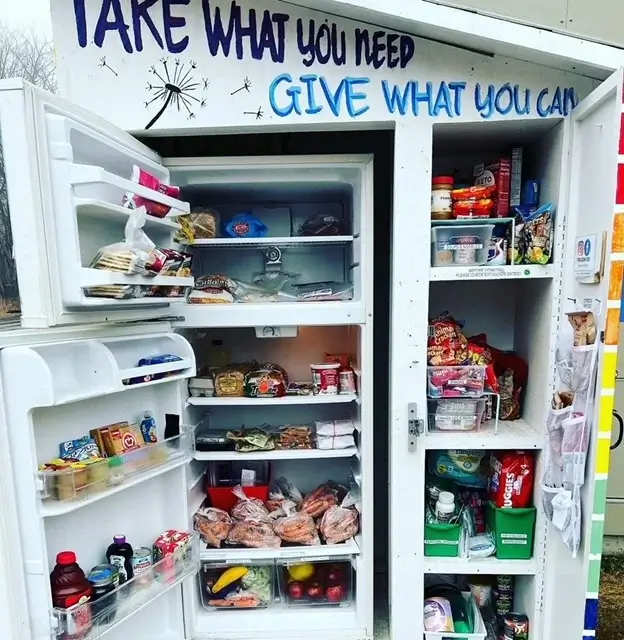
Seacoast Community Fridge. by Alayna Hogan
Hunger and food insecurity exist in every community in the US. Around 12.8 percent of US households experienced food insecurity in 2022.
That’s 17 million households experiencing food insecurity in a country that throws out more food than any other country in the world—120 billion pounds every year, equivalent to almost 40 percent of the entire US food supply. That’s 325 pounds of wasted food per person.
In other words, no one in the US should be going hungry. There is plenty of food to go around. It’s just a matter of getting it to hungry people before it gets to the dump to rot and, in the process, produces large quantities of methane that contributes an estimated eight percent to global carbon emissions.
While we all wait (not holding our breath) for the government to creak into action, a network of community activists has emerged in small towns and huge cities alike to help get food to the people who most need it. Every community has different needs, and there is no one-size-fits-all solution, which makes this highly individualized approach more effective than many of the larger-scale, generic, government-sponsored options out there.
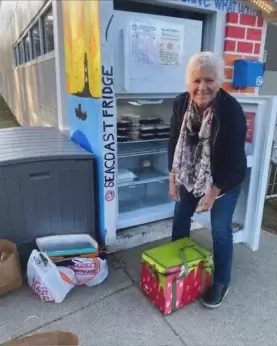
Seacoast Fridge partners with local farms and food trucks
“A colleague told me about the growth of community fridges that offer free food to anyone who needs it, no questions asked,” says Whitney Blethen, recalling the early months of the pandemic, when it was becoming increasingly clear that people were getting hungrier and resources were getting leaner. “I work in a nonprofit that combats childhood hunger, and I’m married to a chef, so it felt like a natural outgrowth.”
Together with Katie Guay and Dave Vargas, Blethen founded the Seacoast Fridge in Kittery, Maine in 2021.
“We discovered that the Good Samaritan Food Donation Act protects people operating free fridges, which made us feel like there was no risk and only benefits,” says Blethen.
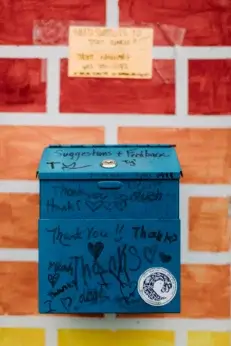
They reached out to the local rotary club so that they could “piggyback” on their general liability insurance, which covered a wide range of potential injuries or accidents that could occur when picking up or delivering food. Eventually, they partnered with Red’s Good Vibes, a free mobile food truck and nonprofit based in Portsmouth, N.H., which aligns with their mission and has expanded their reach.
“That has been a game changer,” says Blethen. “They already had a network of farms, and because we all have backgrounds in food safety and liability, we began labeling foods early on with ingredients and use-by dates to prevent any issues.”
In the beginning, their one fridge would be emptied in about 72 hours. Now, they have plans for 24 fridges this year, with turnovers currently at up to four times per day per fridge. Their mission has grown along with the size of their operation, and it now includes 150 volunteers. They’ve also started food rescue programs with farms and restaurants, where “some farms allow CSA members to add $5 to their order. They use that to fund additional drop-offs for us.”
In addition to the fresh food, Seacoast offers seasonally appropriate pantry items, from sunblock and tick spray to socks and gloves.
“We also work with our local Land Trust, and they have kids tending gardens,” says Blethen. “All of the food then gets donated to fridges or pantries. It’s great for everyone, including the kids.”
To learn more, donate or find a free fridge in Maine or New Hampshire, follow Seacoast on Instagram at @seacoastfridge.
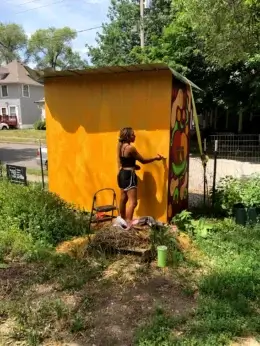
Sweet Tooth Community Fridge takes advantage of tax credits to pay farmers
“In Iowa, our legislature is hostile to poor people,” says Monika Owczarski. “With the city doing nothing substantial to fight poverty and our own situation, we knew we had to do something.”
Starting in 2016, Owczarski operated a pop-up food stand near her urban farm, Sweet Tooth Farm, in Des Moines. As soon as she could get authorized, she began accepting food stamps. During the pandemic, Owczarski saw a noticeable increase in need and a decrease in formal support. Then, in 2021, the city changed the rules about farming and Owczarski went from having more than an acre in production to having about three city blocks.
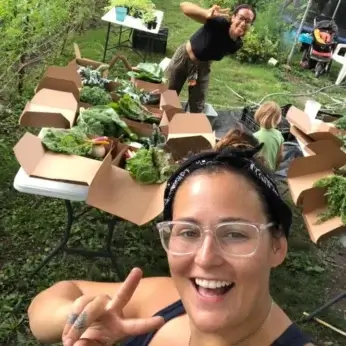
“We were left with one-tenth of the space, which meant we couldn’t produce enough for our restaurant clients and our weekly CSA,” says Owczarski. “Then, a soup kitchen near us got shut down.” That was the last straw for Owczarski.
She reached out to other nonprofits, farmers and food organizations and began giving out free food to anyone who wanted it, no questions asked, with one fridge. It was the first fridge in the state. And it actually helps Owczarski pay the bills after her CSA and farming model got turned upside down.
“The [Farm to Food Donation Tax Credit] program pays farmers for the food they donate,” she explains, adding that they also get donations from restaurants, caterers and others with an excess of food that might otherwise get tossed in the landfill.
Now, the network has 16 fridges, but it is totally decentralized.
“In the last 30 days alone, we have rescued 200,000 pounds of food that would have otherwise been thrown out,” says Owczarski. “Every neighborhood’s needs are different, with some needing no pork for religious reasons and others needing more of one thing or another just because of the community they’re serving.”
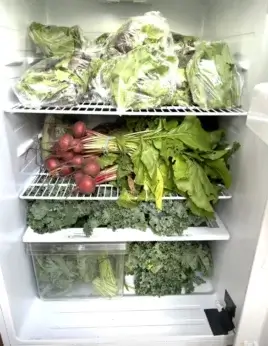
The biggest challenge, says Owczarski, has been the climate.
“We had to figure out a way to prevent the fridges from shorting out on days that are -40 degrees,” says Owczarski. “We insulate the fridges, build shelters and even have safe fireproof infrared heaters that turn on when the temperature gets below a certain threshold.”
To learn more, donate and find fridges around Des Moines, follow @sweetthoothfarmdscm on Instagram.
Free Food Fridge looks to the nonprofit world
Jammella Anderson founded Free Food Fridge Albany during the pandemic.
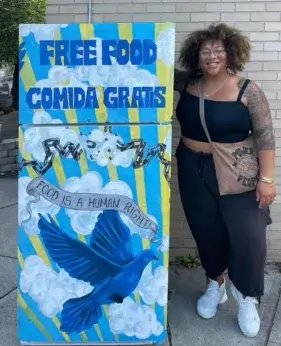
“Access to fresh foods and produce has been an issue for years in Albany and beyond because of structural racism and redlining,” says Anderson. “The pandemic made that worse for everyone, and people who were managing to get by before but were residing on an income cliff suddenly found themselves without options during the pandemic.”
If someone makes just $10 above the cutoff for receiving SNAP or other income-based benefits, they are out of luck, they explain. That means “a lot of people going hungry,” says Anderson.
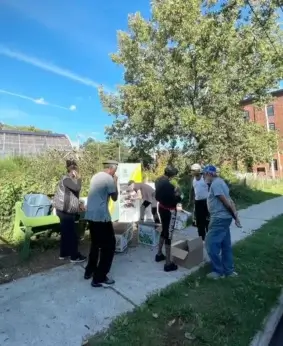
Seeing what was happening in Albany, the part-time doula and yoga instructor went into action, putting out a call to followers on Instagram and snagging a free fridge from Lowe’s and a location for their first fridge on Elm Street in Albany in the process.
Free Food Fridge has grown considerably since 2020, and by the end of the summer, there will be 21 fridges around Albany. Donations roll in from individuals and farmers. Some contributions are regular, others are one-time only, some are in the form of food and others are in the form of money.
“Our next phase is officially becoming a nonprofit because we are volunteer run and creating a mobile grocery that can shuttle around Albany, travel to all of our fridge locations and serve as a pop-up at farmers markets and food justice organizations,” says Anderson.
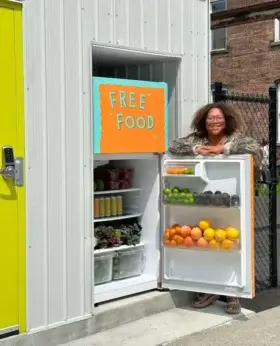
They are also trying to change the way we discuss food access.
“You can’t say that a hungry person looks like this or underserved communities look like that,” says Anderson. “We need to change that dialogue because, just like there isn’t one solution to hunger, there isn’t one type of hungry person or underserved community.”
To learn more, donate and find fridges in Albany, follow Free Food Fridge Albany on Instagram.
RVA Community Fridge for Kids gathers on social media
“I grew up with community fridges in New Orleans, but that wasn’t really done here,” says RVA Community Fridges founder Taylor Scott. “And I saw SNAP Benefits getting cut in Richmond, and all of these historically redlined areas without access to a grocery store or other resources, and I knew I had to do something.”
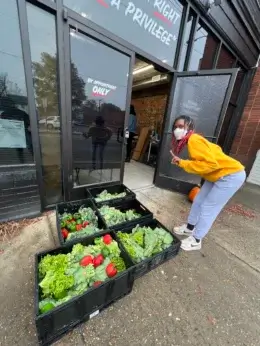
The project started small, as a literal overgrowth of tomatoes threatened to take over her apartment during the pandemic. She looked for a community fridge to which to donate her bounty, in the hopes that her fresh-grown produce could help provide fresh produce to underserved areas.
But Scott couldn’t find any community fridges. She reached out to a neighborhood bakery in Church Hill and it agreed to host a fridge. It went up in January 2021. “As soon as we filled it, it would empty out,” says Scott. “Now, we have 14 fridges, and the entire community is involved. We have more than 300 volunteers helping us buy food and operate, not counting people who just drop stuff off at fridges.”
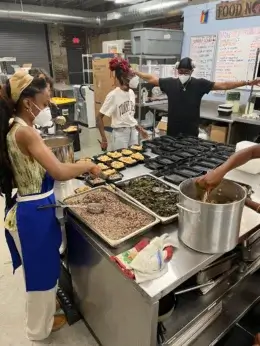
Scott communicates with the volunteers, farms, caterers and chefs who donate food that might otherwise go to the landfill through the communication platform Discord and the social media groups she has set up. Their fridges and the pantries with household goods attached sometimes empty out in as little as 30 minutes.
“I love seeing how these fridges are bringing our community together,” says Scott. “Some neighborhoods are in absolute food deserts, and raising awareness among people in Richmond who wouldn’t otherwise realize what has been going on in these neighborhoods, while feeding people and fighting food waste, has been incredible.”
Scott says the group is in the process of applying to be an official nonprofit. To learn more, donate and find a fridge, follow RVA Community Fridges on Instagram.
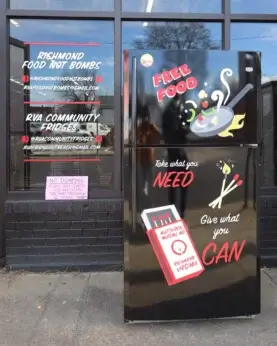
Follow us
This work is licensed under a Creative Commons Attribution-NoDerivatives 4.0 International License.
Want to republish a Modern Farmer story?
We are happy for Modern Farmer stories to be shared, and encourage you to republish our articles for your audience. When doing so, we ask that you follow these guidelines:
Please credit us and our writers
For the author byline, please use “Author Name, Modern Farmer.” At the top of our stories, if on the web, please include this text and link: “This story was originally published by Modern Farmer.”
Please make sure to include a link back to either our home page or the article URL.
At the bottom of the story, please include the following text:
“Modern Farmer is a nonprofit initiative dedicated to raising awareness and catalyzing action at the intersection of food, agriculture, and society. Read more at <link>Modern Farmer</link>.”
Use our widget
We’d like to be able to track our stories, so we ask that if you republish our content, you do so using our widget (located on the left hand side of the article). The HTML code has a built-in tracker that tells us the data and domain where the story was published, as well as view counts.
Check the image requirements
It’s your responsibility to confirm you're licensed to republish images in our articles. Some images, such as those from commercial providers, don't allow their images to be republished without permission or payment. Copyright terms are generally listed in the image caption and attribution. You are welcome to omit our images or substitute with your own. Charts and interactive graphics follow the same rules.
Don’t change too much. Or, ask us first.
Articles must be republished in their entirety. It’s okay to change references to time (“today” to “yesterday”) or location (“Iowa City, IA” to “here”). But please keep everything else the same.
If you feel strongly that a more material edit needs to be made, get in touch with us at [email protected]. We’re happy to discuss it with the original author, but we must have prior approval for changes before publication.
Special cases
Extracts. You may run the first few lines or paragraphs of the article and then say: “Read the full article at Modern Farmer” with a link back to the original article.
Quotes. You may quote authors provided you include a link back to the article URL.
Translations. These require writer approval. To inquire about translation of a Modern Farmer article, contact us at [email protected]
Signed consent / copyright release forms. These are not required, provided you are following these guidelines.
Print. Articles can be republished in print under these same rules, with the exception that you do not need to include the links.
Tag us
When sharing the story on social media, please tag us using the following: - Twitter (@ModFarm) - Facebook (@ModernFarmerMedia) - Instagram (@modfarm)
Use our content respectfully
Modern Farmer is a nonprofit and as such we share our content for free and in good faith in order to reach new audiences. Respectfully,
No selling ads against our stories. It’s okay to put our stories on pages with ads.
Don’t republish our material wholesale, or automatically; you need to select stories to be republished individually.
You have no rights to sell, license, syndicate, or otherwise represent yourself as the authorized owner of our material to any third parties. This means that you cannot actively publish or submit our work for syndication to third party platforms or apps like Apple News or Google News. We understand that publishers cannot fully control when certain third parties automatically summarize or crawl content from publishers’ own sites.
Keep in touch
We want to hear from you if you love Modern Farmer content, have a collaboration idea, or anything else to share. As a nonprofit outlet, we work in service of our community and are always open to comments, feedback, and ideas. Contact us at [email protected].by Kathleen Wilcox, Modern Farmer
July 22, 2024
Modern Farmer Weekly
Solutions Hub
Innovations, ideas and inspiration. Actionable solutions for a resilient food system.
ExploreExplore other topics
Share With Us
We want to hear from Modern Farmer readers who have thoughtful commentary, actionable solutions, or helpful ideas to share.
SubmitNecessary cookies are absolutely essential for the website to function properly. This category only includes cookies that ensures basic functionalities and security features of the website. These cookies do not store any personal information.
Any cookies that may not be particularly necessary for the website to function and are used specifically to collect user personal data via analytics, ads, other embedded contents are termed as non-necessary cookies.